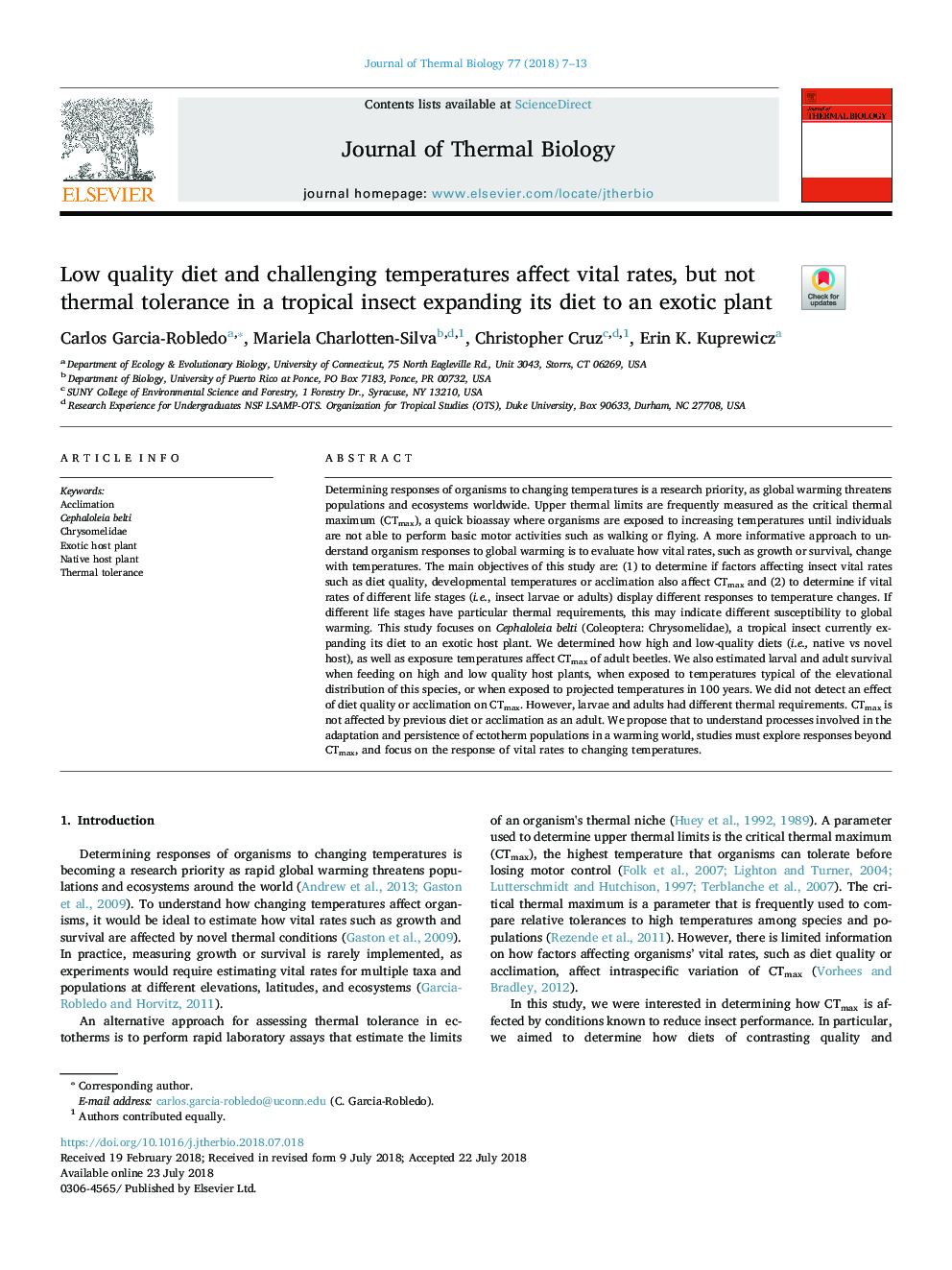| کد مقاله | کد نشریه | سال انتشار | مقاله انگلیسی | نسخه تمام متن |
|---|---|---|---|---|
| 8649912 | 1571070 | 2018 | 7 صفحه PDF | دانلود رایگان |
عنوان انگلیسی مقاله ISI
Low quality diet and challenging temperatures affect vital rates, but not thermal tolerance in a tropical insect expanding its diet to an exotic plant
ترجمه فارسی عنوان
رژیم با کیفیت پایین و دماهای چالش بر میزان حیاتی تاثیر می گذارد، اما تحمل گرما در حشرات گرمسیری که رژیم غذایی آن را به یک گیاه عجیب و غریب گسترش می دهد
دانلود مقاله + سفارش ترجمه
دانلود مقاله ISI انگلیسی
رایگان برای ایرانیان
موضوعات مرتبط
علوم زیستی و بیوفناوری
علوم کشاورزی و بیولوژیک
علوم کشاورزی و بیولوژیک (عمومی)
چکیده انگلیسی
Determining responses of organisms to changing temperatures is a research priority, as global warming threatens populations and ecosystems worldwide. Upper thermal limits are frequently measured as the critical thermal maximum (CTmax), a quick bioassay where organisms are exposed to increasing temperatures until individuals are not able to perform basic motor activities such as walking or flying. A more informative approach to understand organism responses to global warming is to evaluate how vital rates, such as growth or survival, change with temperatures. The main objectives of this study are: (1) to determine if factors affecting insect vital rates such as diet quality, developmental temperatures or acclimation also affect CTmax and (2) to determine if vital rates of different life stages (i.e., insect larvae or adults) display different responses to temperature changes. If different life stages have particular thermal requirements, this may indicate different susceptibility to global warming. This study focuses on Cephaloleia belti (Coleoptera: Chrysomelidae), a tropical insect currently expanding its diet to an exotic host plant. We determined how high and low-quality diets (i.e., native vs novel host), as well as exposure temperatures affect CTmax of adult beetles. We also estimated larval and adult survival when feeding on high and low quality host plants, when exposed to temperatures typical of the elevational distribution of this species, or when exposed to projected temperatures in 100 years. We did not detect an effect of diet quality or acclimation on CTmax. However, larvae and adults had different thermal requirements. CTmax is not affected by previous diet or acclimation as an adult. We propose that to understand processes involved in the adaptation and persistence of ectotherm populations in a warming world, studies must explore responses beyond CTmax, and focus on the response of vital rates to changing temperatures.
ناشر
Database: Elsevier - ScienceDirect (ساینس دایرکت)
Journal: Journal of Thermal Biology - Volume 77, October 2018, Pages 7-13
Journal: Journal of Thermal Biology - Volume 77, October 2018, Pages 7-13
نویسندگان
Carlos Garcia-Robledo, Mariela Charlotten-Silva, Christopher Cruz, Erin K. Kuprewicz,
